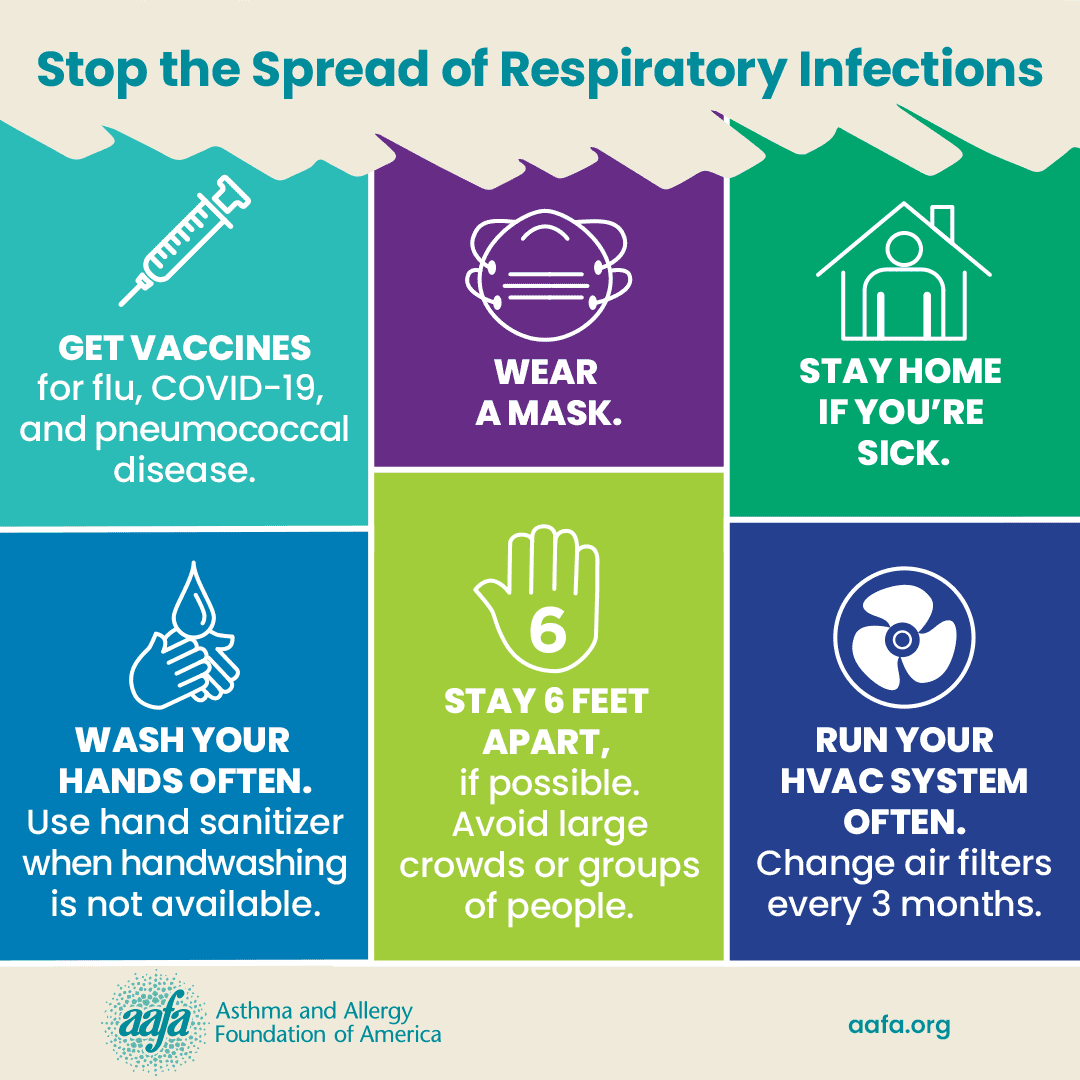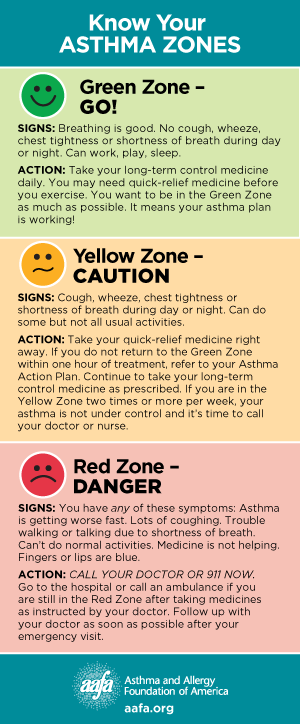If you have asthma, or live with someone who does, you need to know about respiratory infections. They affect the nose, sinuses, throat, and airways. They are a major cause of asthma symptoms and attacks. And some infections can lead to other serious conditions, like pneumonia. People with asthma and people close to them need to protect themselves from respiratory illnesses.
Common respiratory infections include:
- The flu (influenza)
- COVID-19 (caused by the new coronavirus)
- Pneumococcal [noo-muh-kok-uhl] disease, like pneumonia
- The common cold
How Respiratory Infections Spread
When you understand how respiratory infections can spread, you can take steps to reduce your chances of getting them. These germs usually spread from person to person when you are in close contact with someone who is sick.
- Through the air − When a person who is infected coughs, sneezes, or talks, small amounts of the virus spread through the air. People nearby who breathe that air in can catch the germs.
- Through direct contact − When a person who is infected touches their nose, mouth, eyes, or they will have the germs on their hands. When they touch another person or an object that another person will touch, the virus can spread.
Sometimes, you can spread germs before you have any symptoms. This is common with the flu and the new coronavirus.
Differences Between the Most Common Respiratory Infections
Four of the most common types of respiratory infections are COVID-19, the flu, pneumococcal disease, and colds.
COVID-19
COVID-19 is a disease caused by the SARS-CoV-2 virus, also called the new coronavirus. It started spreading around the world in December 2019. It can cause a respiratory infection and spreads easily. More than 400,000 Americans have died from COVID-19 since it started spreading.
Some people can have COVID-19 and not show any symptoms. But other people can become very sick, especially older adults and people with other health conditions. According to the research so far, people with asthma – especially well-controlled asthma – most likely aren’t at higher risk for complications from COVID-19. But it is still important to protect yourself from getting sick with COVID-19.
RELATED CONTENT: Coronavirus (COVID-19): What People With Asthma Need to Know
Flu (Influenza)
The flu is a respiratory infection caused by the influenza virus. It affects the nose, throat and sometimes the lungs. It spreads from October through May every year. The flu is a serious illness that millions of Americans get each year. It sends hundreds of thousands of people to the hospital and causes thousands of deaths.
People with asthma are at high risk for having serious complications from the flu, like asthma attacks and pneumonia.
RELATED CONTENT: 4 Things You Must Know About the Flu If You Have Asthma
Pneumococcal Disease
Many people have never heard of pneumococcal disease. But it can cause more commonly known illnesses, like pneumonia, meningitis, sepsis, and ear infections. Anyone can get it, but people with asthma are at high risk for complications. About 150,000 Americans go to the hospital for pneumococcal pneumonia each year. Tens of thousands of Americans die from pneumococcal disease each year.
People who have certain medical conditions, are age 65 and older, or are under 6 should get the pneumococcal vaccine, if they haven’t gotten it in the past. If you have asthma, talk with your doctor to see if you should get the vaccine. Most adults only need the shot once. But you may need a second one if it has been a while since you got the vaccine.
Bacteria causes pneumococcal disease. We can often fight bacterial infections with antibiotics. So call your doctor right away if you have symptoms.
Common Cold
A common cold is usually mild and doesn’t cause serious complications. But it can still cause asthma symptoms. People with asthma still need to take precautions to prevent getting colds. Antibiotics will not help colds because they are caused by viruses. Antibiotics only fight bacteria, not viruses.
How to Protect Yourself and Other People From Respiratory Infections
With the right steps, you can reduce your chances of getting and spreading respiratory infections.
These steps can help reduce the spread of all respiratory infections:
- Wear face masks or coverings.
- Wash your hands often for at least 20 seconds.
- Avoid touching your face.
- Practice physical distancing, at least 6 feet apart.
- Avoid large groups of people.
- Follow your Asthma Action Plan by taking your medicines as directed by your doctor and keep your asthma well-controlled.
- Get the flu shot every year.
- Get a pneumococcal shot as directed by your doctor.
- Get the COVID-19 vaccine.

RELATED CONTENT: How Can You Tell the Difference Between COVID-19, a Cold, the Flu, Allergies and Asthma?
Sometimes, no matter how hard you try, you can still get a respiratory infection. If you do get sick, call your doctor right away. Follow the Yellow Zone of your Asthma Action Plan. Your doctor may change or increase your medicine until you are better. If you have the flu, they may also prescribe an anti-viral treatment that can lessen symptoms. But remember that antibiotics do not help the flu or colds.
Rest, drink water, stay away from others so you do not spread the infection, and avoid alcohol and tobacco too. And if you have Red Zone symptoms, call your doctor or 911 right away.
How do you stay healthy and avoid asthma symptoms during cold and flu season and as COVID-19 spreads? Join our community to learn more about protecting yourself from the flu, COVID-19 and other respiratory infections.


Comments (1)